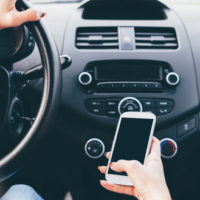Hands-Free Devices: Are They Really Safer While Driving?

Distracted driving has quickly become the number one cause of accidents in the U.S. today, outranking those caused by drunk drivers and reckless drivers. This is wholly thanks to technology, which has enabled us to do more from just about anywhere with an internet connection. To cut back on the number of distracted driving accidents, most states have implemented a no-texting-and-driving laws, with some states even going so far as to implement no-talking-and-driving laws. In response to these laws, cell phone companies and other technology giants have developed hands-free devices, but are hands-free devices really safer?
The Downfalls of Hands-Free Devices
According to the National Safety Council, hands-free devices come with their own perils. While hands-free devices do allow drivers to keep their hands on the wheel, it is not necessarily the lack of hands that lead to accidents—it is the lack of concentration. According to the infographic, the distraction lies not in the holding of the device but in the call itself. Below are just a few stats about hands-free device use while driving that may be of interest to you:
- The activity in the area of the brain that processes moving objects decreases by 1/3 when listening to a call or talking on the phone;
- Drivers who are looking out of the windshield can miss 50 percent of what lies ahead of them when talking on the phone;
- Studies show that voice text is MORE distracting than physical typing out a message; and
- Trying to talk on the phone and drive is like trying to talk on the phone and read a book.
The study suggests that the human brain is just not capable of multitasking in that manner. While trying to multitask at home comes with little consequences—or, at least, not severe ones—trying to multitask on the road is a life-risking endeavor, and one that should be avoided at all costs. The National Safety Council urges drivers to take the pledge and entirely refrain from cell phone use while behind the wheel.
Recuperating Damages From a Distracted Driving Accident
Just because someone’s actions are not illegal does not mean that he or she cannot be reprimanded for causing injury to someone else, or that accident victims do not deserve compensation for their injuries caused by the other person. If you were involved in a car accident that was caused by a distracted driver, you are entitled to compensation. A skilled Miami personal injury attorney can review the circumstances surrounding your accident and fight on your behalf to prove negligence and recover a monetary award. Like with all car accident claims, you should not attempt to fight your case on your own. Contact an experienced lawyer who understands the law and who can negotiate for a fair settlement on your behalf.
Contact Spencer Morgan Law Today
If you or a loved one was injured in a car accident caused by a negligent driver, do not hesitate to give our Miami law firm a call. We specialize in car accident cases and are prepared to provide the legal assistance you need to prove your case and recover a fair amount of compensation. Contact Spencer Morgan Law today to work toward the recovery you need and deserve.
Resource:
nsc.org/road-safety/tools-resources/infographics/hands-free-is-not-risk-free
